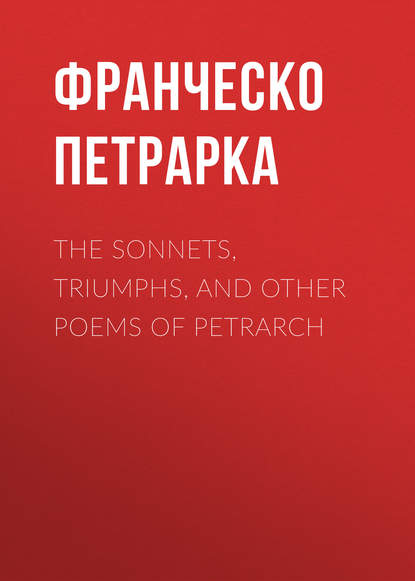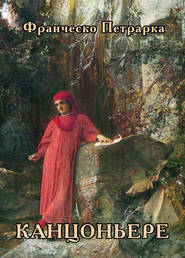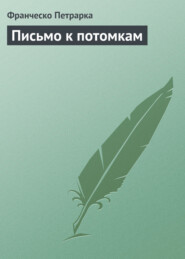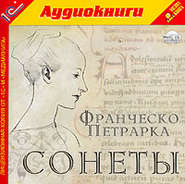По всем вопросам обращайтесь на: info@litportal.ru
(©) 2003-2025.
✖
The Sonnets, Triumphs, and Other Poems of Petrarch
Настройки чтения
Размер шрифта
Высота строк
Поля
Thus, as I view'd th' interminable host,
The prospect seem'd at last in dimness lost:
But still the wish remain'd their doom to know,
As, watchful, I survey'd the passing show.
As each majestic form emerged to light,
Thither, intent, I turn'd my sharpen'd sight;
And soon a noble pair my notice drew,
That, hand in hand approaching, met my view.
In gentle parley, and communion sweet—
With looks of love, they seem'd mine eyes to meet;
Yet strange was their attire—their tongue unknown
Spoke them the natives of a distant zone;
But every doubt my kind assistant clear'd,
Instant I knew them, when their names were heard.
To one, encouraged by his aspect mild,
I spoke—the other with a frown recoil'd.—
"O Masinissa!"—thus my speech began,
"By Scipio's friendship, and the gentle ban
Of constant love, attend my warm request."
Turning around, the solemn shade address'd
His answer thus:—"With like desire I glow
Your lineage, name, and character, to know,
Since you have learnt my name." With soft reply
I said, "A name like mine can nought supply
The notice of renown like yours to claim.
No smother'd spark like mine emits a flame
To catch the public eye, as you can boast—
A leading name in Cupid's numerous host!
Alike his future victims and the past
Shall own the common tie, while time itself shall last.
But tell me (if your guide allow a space
The semblance of those tendant shades to trace)
The names and fortunes of the following pair
Who seem the noblest gifts of mind to share."—
"My name," he said, "you seem to know so well
That faithful Memory all the rest can tell;
But as the sad detail may soothe my woes,
Listen, while I my mournful doom disclose:—
To Rome and Scipio's cause my faith was bound,
E'en Lælius scarce a warmer friendship own'd:
Where'er their ensigns fann'd the summer sky,
I led my Libyans on, a firm ally;
Propitious Fortune still advanced his name,
Yet more than she bestow'd, his worth might claim.
Still we advanced, and still our glory grew
While westward far the Roman eagle flew
With conquest wing'd; but my unlucky star
Led me, unconscious, to the fatal snare
Which Love had laid. I saw the regal dame—
Our hearts at once confess'd a mutual flame.
Caught by the lure of interdicted joys,
Proudly I scorn'd the stern forbidding voice
Of Roman policy; and hoped the vows
At Hymen's altar sworn, might save my spouse.
But, oh! that wondrous man, who ne'er would yield
To passion's call, the cruel sentence seal'd,
That tore my consort from my fond embrace,
And left me sunk in anguish and disgrace.
Unmoved he saw my briny sorrows flow,
Unmoved he listen'd to my tale of woe!
But friendship, waked at last, with reverent awe,
Obsequious, own'd his mind's superior law;
And to that holy and unclouded light,
That led him on through passion's dubious night,
Submiss I bow'd; for, oh! the beam of day
Is dark to him that wants her guiding ray!—
Love, hardly conquer'd, long repined in vain,
When Justice link'd the adamantine chain;
And cruel Friendship o'er the conquer'd ground
Raised with strong hand th' insuperable mound.
To him I owed my laurels nobly won—
I loved him as a brother, sire, and son,
For in an equal race our lives had run;
Yet the sad price I paid with burning tears;—
Dire was the cause that woke my gloomy fears!
Too well the sad result my soul divined,
Too well I knew the unsubmitting mind
Of Sophonisba would prefer the tomb
To stern captivity's ignoble doom.
I, too, sad victim of celestial wrath,
Was forced to aid the tardy stroke of death:
With pangs I yielded to her piercing cries,
To speed her passage to the nether skies;
And worse than death endured, her mind to save
From shame, more hateful than the yawning grave.—
What was my anguish, when she seized the bowl,
She knows! and you, whose sympathising soul
Has felt the fiery shaft, may guess my pains—
Now tears and anguish are her sole remains.
That treasure, to preserve my faith to Rome,
Those hands committed to th' untimely tomb;
And every hope and joy of life resign'd
To keep the stain of falsehood from my mind.
But hasten, and the moving pomp survey,
(The light-wing'd moments brook no long delay),
To try if any form your notice claims
Among those love-lorn youths and amorous dames."—
With poignant grief I heard his tale of woe,
That seem'd to melt my heart like vernal snow,














